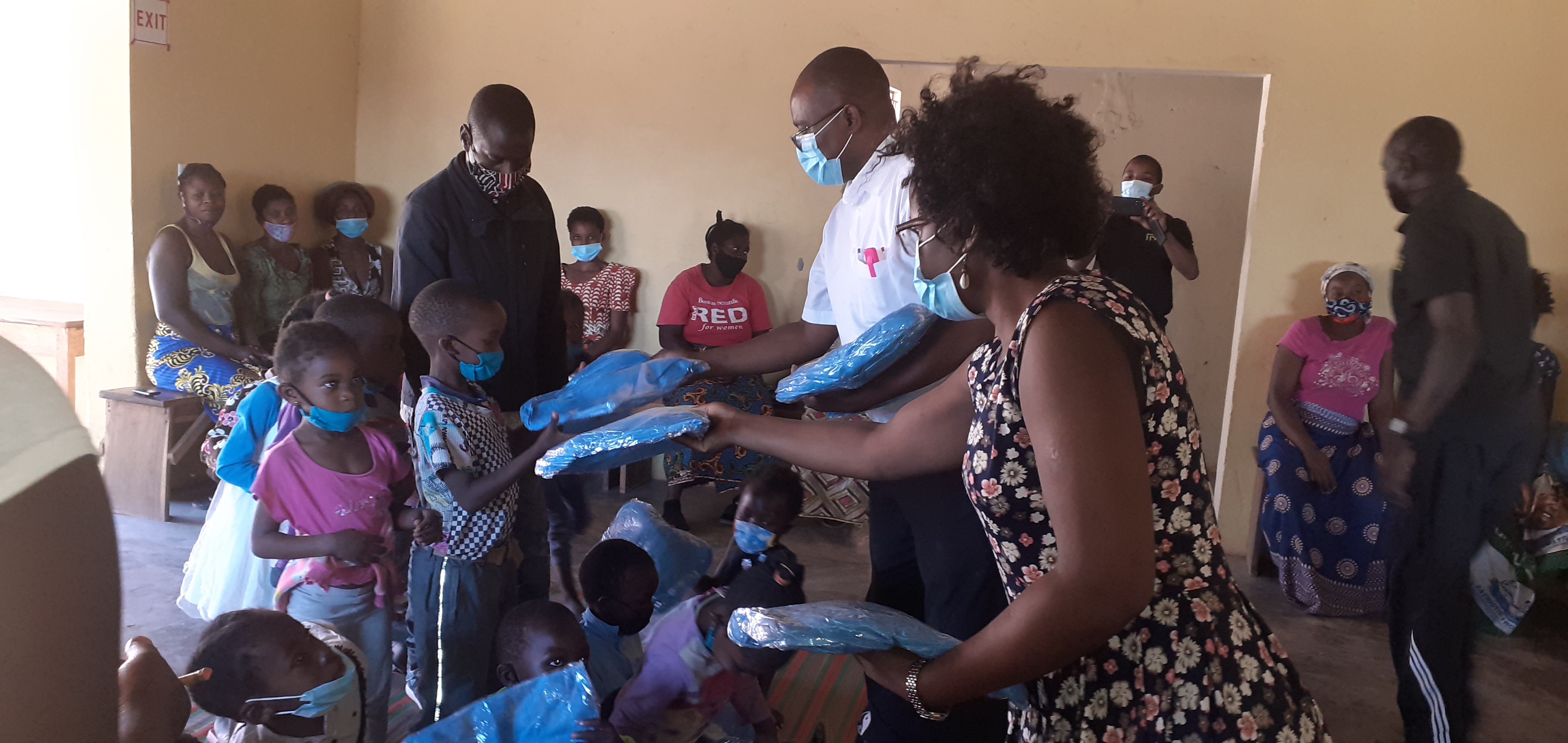Updates—
Mosquito Net Impact 2021
Executive Summary
Thank You!
The Power of Love team along with the beneficiary families, would like to say a “big thank you” for your continued support. Your support has resulted in lowering the incidence of malaria, improved health, higher school attendance, and economic stability in high transmission communities in Zambia.
Great News
We are thrilled, as we now have a WHO (World Health Organization) approved vaccine for malaria.. The new vaccine can save the lives of more than 20,000 children if administered to all children in high incidence malaria countries in Africa. However, it will have to be used along with existing tools such as insecticide treated nets and anti-malarial drugs. The Power of Love team has the knowhow to administer the vaccine to young children and we are anxiously awaiting its arrival in Zambia. Till then, we will continue to keep children and families safe from malaria via the provision of malaria bed nets.
Our Response
In 2021, 15,000 long lasting insecticide treated nets and education on malaria prevention was provided benefitting more than 50,000 children/25,000 adults as each net can sleep up to four young children or two adults. For 2022, our plan is to provide 18,000-20,000 nets and education.
Impact of COVID
Cases on Malaria
The COVID-19 pandemic and restrictions related to the response have caused disruptions in essential malaria services. According to the World Malaria report, malaria mortality in sub-Saharan Africa could double by the end of 2020, relative to a 2018 baseline, if extreme disruption in prevention and treatment occurred. Up till August 2020, COVID cases in Africa remained modest as compared with many regions worldwide. Since then, the incidence of COVID cases in some countries in Africa has been increasing rapidly. Countries in Africa are building a public health response to contain the spread of COVID-19 morbidity and mortality. However, these measures could be constrained by limited resources for health care and a high incidence of other infectious diseases.
Malaria in Africa

Since 2000, malaria cases and deaths have been declining in Africa due to the provision of insecticide-treated nets (ITNs) and antimalarial drugs. A decrease in access in either or both would lead to potentially catastrophic increases in malaria morbidity and, mortality within Africa. According to the World health Organization, a 25% disruption in access to effective antimalarial treatment in sub-Saharan Africa could lead to 46,000 additional deaths. Hence, there is a continuing need to escalate malaria prevention measures to prevent the resurgence of this disease and consequent loss of productivity and life. Between 2010 and 2019, malaria case incidence fell by 23% and malaria mortality rate fell by 15% globally. We have momentum. Let us not stop now.
Why Zambia
Malaria transmission rates are high in all areas in Zambia, due to high co-infections rates between HIV and malaria, water collection, and poor sanitation. In 2019, only 52% of the people within a household in sub-Saharan Africa had access to an ITN, increasing from 3% in 2000. This implies that almost half of the households do not have access to even one net and the rest need more than one net per household as the average household size is six or more people. Pregnant women living with HIV, and children under five are highly vulnerable to malaria infection and death. However, only 52% of pregnant women and children under five use a net.
Malaria Free Zambia
Based on research studies and feedback from the ground, a slowing down in the provision of ITN’s during COVID could have a disastrous impact on the number of malaria cases and deaths. There is a need for a sustained malaria prevention program so that Zambia can be malaria free in the next 3-4 years. Our plan is to increase the provision of ITN’s and education to vulnerable populations. Ending infectious diseases like malaria is vital if we are to meet the UN’s Sustainable Development Goals. Preventing malaria, in addition to saving precious lives, provides huge economic benefits globally.

Project Mosquito Nets Program Activities in 2021
A Scientific Breakthrough
We now have a WHO approved vaccine for malaria. According to the WHO Director-General, this "changes the course of public health history". This is a breakthrough development as this is the first vaccine that can immunize against a parasitic infection. The new vaccine can save the lives of more than 20,000 children if administered to all children in high incidence malaria countries in Africa. However, it will have to be used along with existing tools such as insecticide treated nets and anti-malarial drugs as the vaccine has only 30% efficacy and requires four doses. In addition, ample funding, and clear guidelines to ground teams will be crucial to its success. The Power of Love team has the knowhow to administer the vaccine to young children and we are anxiously awaiting its arrival in Zambia. Till then, we will continue to keep children and families safe from malaria via the provision of insecticide treated nets.
Education on Malaria
Trained health care professionals provided health education and information about malaria in the local language. Topics discussed during the education session included:
- hygiene, drainage maintenance, filling and/or removal of mosquito breeding sites,
- proper use and maintenance of nets (cleaning and storage) to prevent damage,
- impact of malaria (low birth weight) in pregnancy,
- information about malaria for HIV+ children,
- identification of signs and symptoms of malaria, and
- information regarding regular re-treatment of nets, cost, and location.
Health care professionals explained how best to prevent malaria. Information regarding location, timing, and cost of re-treatment of nets was provided. In addition, the importance of keeping nets clean and stored properly was emphasized. Finally, families were informed about the importance of preventing malaria as it can be fatal for HIV+ pregnant women and young children. This was followed by a demonstration on the proper use of nets.
Beneficiary Communities
Several urban communities like Lusaka, and rural communities were selected based on need and high malaria transmission rates due to poor sanitation. The rural communities are Kafue , Chongwe, Chisamaba , Mansa, Lufusa , and Njolwe. Many rural communities are located by a river/swamp which are good breeding grounds for mosquitoes, and the nearest clinic being 15-20 miles away. Beneficiary communities were selected with the help of community organizations such as churches, and government health clinics. Direct beneficiaries are children living with HIV, young children, pregnant women, breast feeding moms, and adults who are infected with TB and/or HIV. More than 25,000 children and adults benefitted as each net can sleep up to four young children or two adults.
Our Program is Unique
This program is a part of a comprehensive program that includes pediatric HIV care and women’s empowerment programs. Many beneficiary families are enrolled in multiple programs to help achieve family sustainability. Second, nets provision is preceded by provision of education. Third, follow-up studies are conducted regularly to assess impact and gather feedback from community residents.
Lives can be Saved
Studies have shown that for every 1,000 children protected by a net, 5.5 lives will be saved each year. Since the cost of provision of a net is $5 (or less), a child’s life can be saved for a small investment. Additionally, since a net can sleep 3-4 young children or two adults and can be used for two years, families can stay be malaria free and healthy for just a few cents per day.
Program Impact

One net can sleep up to four young children or two adults. This implies that one net can keep 3-4 children malaria free, healthy, and in school. Provision of 15,000 nets benefitted more than 25,000 children and adults. More specifically, there is an improvement in the quality of life due to:
- fewer malaria infections and deaths,
- fewer visits to hospitals/clinics due to better health,
- with better health, there is an increase in school attendance, and adults miss fewer days at work resulting in economic stability.
Over the past five years we have been able to provide 48,500 nets.
Follow-up Study
To assess the impact of provision of 5,000 nets in April/May 2021, responses from more than 1,250 beneficiaries were gathered via questionnaires in August 2021. A summary of findings is as follows:
- No cases/deaths from malaria were reported
- Almost all beneficiaries had knowledge regarding the proper use, storage, and re-treatment of nets as demonstrated during the education session. A total of 104 out of 1,250 sampled, did not know where to take the nets for re-treatment and they were provided with this information.
- Some beneficiaries commented that they do not have enough room to store the nets during the day as the same room is used as a bedroom room and living room.
- A single net is shared by 2-3 people.
- Most nets were reported to be in good condition.
- There is an improvement in the health of children, resulting in fewer missed days from school.
- There is an improvement in the health of children living with HIV as seen by lower viral load numbers.
- In most areas, the need for nets is high. In most rural areas, governments clinics are located 25-30 miles from home, making it difficult for people to access their services.
- There is a need to provide COVID education and PPE especially in rural areas.
Plan for 2022
Going forward our plan is to continue to expand our malaria prevention program so that more families stay healthy, adults miss fewer days at work, and children can continue their education uninterrupted. For 2022, our goal is to provide 18,000-20,000 insecticide treated nets and education benefitting more than 60,000 children or 35,000 adults.
Conclusion
Based on feedback from beneficiaries, and high transmission rates, and the impact of COVID on malaria prevention efforts, the need for ITN’s continues to be high. The continued provision of ITN’s will take us closer to a malaria free world resulting in healthier, more economically stable families. The new malaria vaccine along with traditional methods of malaria prevention such as insecticide treated nets, anti-malaria drugs, and indoor spraying will go a long way in eradicating malaria in the next few years.